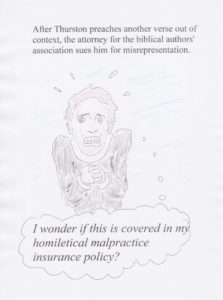For hearing God’s heart and voice in Scripture, see this interview in Pneuma Review:
Category Archives: Interpretation
Who is the thief who comes to destroy?
Craig’s new article in Christianity Today at:
http://www.christianitytoday.com/ct/2017/april/thief-steal-kill-and-destroy-john-10.html
Certain kinds of critical scholars
Does much learning make you mad? Or: dangers of academics?
Recently Aaron Ross interviewed Craig on a blog and asked whether higher learning should cause Christians to lose their faith … or something like that … One could address this in various ways (Craig actually did wrestle with this in some early years, given his former atheism), but this is how he answered it now:
Spirit Hermeneutics
Answers to five questions, on Eerdword:
Homiletical malpractice
Sorry to have more cartoons than Bible studies on this page, but they take less time to write! (If you run out of things to read, though, there’s a huge number of Bible studies in the archives pulldown [“posts by books of the Bible or topic”] on my home page.) But once in awhile even the cartoons have a message …
Cultural Backgrounds Study Bible interview
Michael Brown interviews Craig Keener about his new books, especially the Cultural Backgrounds Study Bible:
Podcast on Spirit Hermeneutics
Philip Zoutendam at Eerdmans interviewed me on the Eerdcast (36.12 minutes), and offers a discount for the next two weeks (Aug. 2016):
Free Bible interpretation manual
Please note that on the “Other Languages” page Craig has a free Bible interpretation manual available in English, Spanish, French, Bulgarian, Russian, and (just added) Portuguese (thanks to a ministry in Brazil; the link is below). (Other free resources appear on the “Free Resources” page of this site, besides the various Bible studies/posts accessible through the home page sidebar with “posts by book of the Bible or topic.”)
Good cultural backgrounds helps us trust Scripture
Lots of skeptics today criticize the Bible, oblivious to the cultural setting that it was addressing. Instead of seeing how biblical texts improved values of their surrounding culture, skeptics condemn the Bible for not promoting twenty-first century values that (whether we agree with those values or not) no one had heard of in biblical times. When Christians read the Bible in an ahistorical way, ignoring the cultural settings that it originally addressed, we play into skeptics’ hands. Just as God communicated the divine message to people in their specific languages, God also communicated to them in concrete cultural settings. Recognizing those settings helps us reapply the Bible’s message more concretely and appropriately in our often different situations today. If you want to apply the Bible rightly, knowing the first situation helps you recognize what kinds of situations are and are not analogous today.


